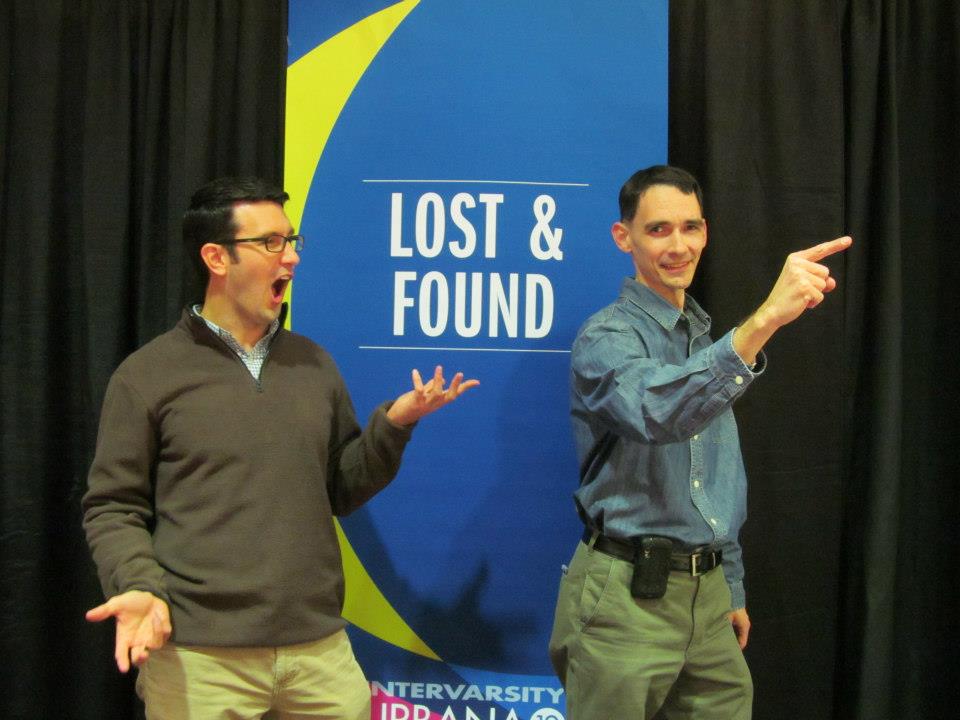This is the piece the third of a four part series in which David Williams shares some historical and theological observations on the Bible passages studied in the Urbana12 business track. The other posts of the series are The Call (Luke 5:1-11), The Kingdom (Luke 10:1-24), and The Lost (Luke 15:1-10). ~ Thomas B. Grosh IV, Associate Director of ESN.
![JESUS MAFA. Zaccheus welcomes Jesus, from Art in the Christian Tradition, a project of the Vanderbilt Divinity Library, Nashville, TN. http://diglib.library.vanderbilt.edu/act-imagelink.pl?RC=48393 [retrieved December 25, 2012].](https://blog.emergingscholars.org/wp-content/uploads/2012/12/Mafa061-large.jpg)
The Found (Luke 19:1-10)
One might have expected Jesus to have said to Zacchaeus what he had said to Levi earlier in Luke’s Gospel: “Follow me.” (5:27) And one might have expected Zacchaeus to do as Levi did: To quit the tax-collecting business, drop everything, and set out to literally follow Jesus in his roaming itinerant ministry. But, of course, that is not what happened.
Strikingly, Jesus does not tell Zacchaeus to quit his job as a tax-collector. Tax-collectors were employees of the Roman occupying force in Israel. They were typically relatively wealthy Jewish men who had the financial means to make up the difference if they could not collect enough to meet Rome’s tax quotas. Though it was an inevitably morally fraught and ambiguous line of work, tax-collecting was, in fact, a position which could be used for good. Well-to-do tax-collectors were supposed serve as financial buffers between their communities and the empire. But, notoriously, it was also a position which was all too easily and all too often exploited. Rather than keeping honest books and protecting their communities, tax-collectors regularly over-taxed people in order to pad their own pockets. Thus they had earned the reputation of being corrupt bureaucrats, sell-outs, thieves and traitors.
Jesus had earned a reputation of his own by spending time with such people, and, as we saw in our last study this was one of the Pharisees’ key bones of contention with him. Indeed, any Israelite who had been ripped-off by one of Rome’s IRS agents might have resented the rabbi from Galilee for dignifying these charlatans with his presence. It’s no wonder, then, that the people of Jericho were scandalized by Jesus’ choice of accommodations. “He has gone to be the guest of one who is a sinner!,” they said. Why not the respectable baker? Or the kindly tent-maker down the street? Why not the head of the synagogue? Why, of all people, Zacchaeus? Perhaps this Jesus is just a sham after all. What kind of prophet pals around with with profiteers?
What the Pharisees and the people of Jericho missed and what Zacchaeus’ story so clearly illustrates, however, is that the invitation to have fellowship with Jesus is itself transformative. Jesus’ unexpected request for Zacchaeus’ hospitality spurs Zacchaeus to an even more unexpected act of staggering generosity and to a radical revision of his business model: “Look, half of my possessions, Lord, I will give to the poor; and if I have defrauded anyone of anything, I will pay back four times as much.” In response to the invitation of Jesus, Zacchaeus went from being Jericho’s most notorious parasite to being Jericho’s most prominent benefactor! For the people of Jericho, Zacchaeus’ transformation was good news indeed.
It is important to note that Jesus does not forthrightly bid Zaccheaus to turn away from shady dealing, either. He does not shame or preach at Zacchaeus. He does not coax or cajole. Instead he simply invites himself over to Zaccheaus’ house. He asks Zacchaeus for his fellowship and allows his invitation and Zacchaeus’ conscience to do the rest.
Today salvation has come to this house, since he also is a son of Abraham,” says Jesus, “For the Son of Man came to seek and to save the lost.” As we saw in our last post, Jesus is not in the business of ostracizing misfits, but rather of inviting them to the table. He is in the business of finding the lost, healing the broken, and restoring the dead to life. For Zacchaeus this meant being rescued from his own selfishness and being restored to life in and for his community. It did not, however, mean salvation from his profession. Sometimes Jesus calls us out of our professions to do something else, as he did with Levi the tax-collector, but sometimes, as in the case of Zachaeus, Jesus calls us to do our work differently. Zacchaeus’ call did not mean the abandonment but rather the transformation of tax-collecting. It meant the advent of honesty and fair-dealing in the Jericho tax office. It meant the financial protection of the vulnerable from their imperial overlords.

Far from being a private spiritual transaction between Zacchaeus and Jesus, Zacchaeus’ response to Jesus’ call had ripple effects that would have reached every corner of the town of Jericho.
Salvation is not simply a matter of saving us from the eternal consequences of our sins, but is also a matter of saving us from our proclivities for selfishness and injustice and saving us for the healing of our communities, the transformation of our transactions with others, and the rectifying of our relationships.
May we all welcome Jesus into our lives as Zacchaeus did, that Jesus’ full-orbed, far-reaching work of salvation might come not only to our houses, but also to our communities and to our world.
David Williams serves part-time as an InterVarsity/Link staff on loan to the Oxford Pastorate, an independent evangelical chaplaincy that ministers to graduate students at the University of Oxford. He is currently pursuing his doctorate in Christian Ethics at the University of Oxford, writing on Friedrich Schleiermacher’s, John Henry Newman’s, and Abraham Kuyper’s divergent theologies of higher education and their potential applications to the modern research university. Before moving to England, David served for five years with InterVarsity’s Graduate & Faculty ministries at New York University. David resides in Oxford, England with his wife Alissa and son Charlie.

Leave a Reply